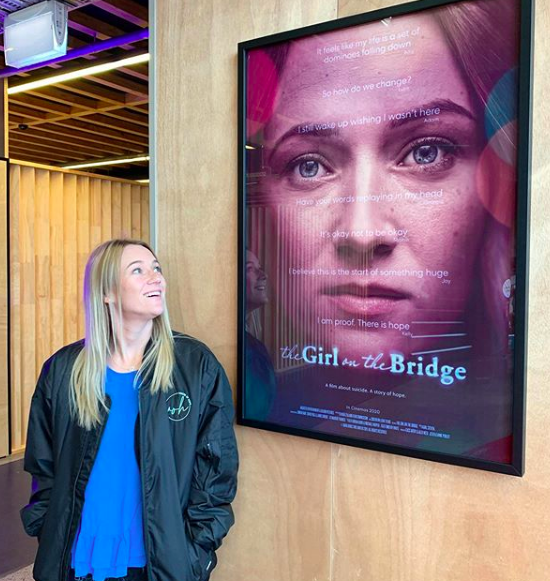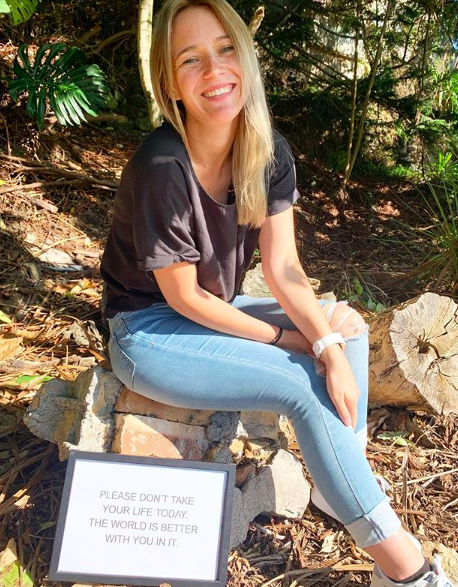Trigger warning: Suicide
After surviving multiple suicide attempts when she was younger, Jazz Thornton has become an advocate for helping young people find hope and also find help in a system she believes is failing them. She is the writer of the bestselling Stop Surviving, Start Fighting and the subject of the new documentary The Girl on the Bridge. She is also the co-founder of the not-for-profit charity Voices Of Hope, which aims to create and implement change for mental health, whilst providing hope through the voices of those with lived experience.
Jazz Thornton, How are you today?
I am good. I’m technically on annual level at the moment – minus the day of interviews today, so I’ve been able to relax this week. I haven’t taken annual leave in about two years, so I figured it was time. I’ve been doing life admin, like sorting out my wardrobe and learning how to paint, which I’m horrific at, but I’m doing it anyway.
It’s been a very full-on few years for you, with simultaneously doing the web series Jessica’s Tree and the documentary covering the behind the scenes for that, The Girl On The Bridge. You’ve also written a book in this time. I wondered how you manage your mental health when you’re talking about your past experiences, without getting yourself back into a difficult position?
The absolute biggest thing for me has been the community around me. I’m very lucky that when I signed the original deal for The Girl On The Bridge and Jess’s Tree, simultaneously, there were people in my life who chose not to be involved whatsoever so that when it got too much, they were able to pull me out and I could go and see them and know that there wouldn’t be cameras, it wouldn’t be recorded. I wouldn’t need to focus on being the person that the public needed me to be and I could just focus on myself. That was a real lifesaver, for the past three to four years. If it looked like it was getting too hard, they would pull me up. But thankfully, I’m in such a better place now than I was as a teenager that I know how to ask for help before it gets to that point.
What are the mental health pillars in your life that you’ve learned are mandatory in order to keep yourself healthy?
The biggest one is asking for help, early. I was someone who – and I think it could have a lot to do with New Zealand culture – I would kind of wait until I was in crisis before I would ask for help. It seemed too minimal and ‘you don’t want to waste people’s time with something so minimal!’ so I would wait until I had a full meltdown to then reach out. And one of the things I’ve learnt is that’s not a healthy thing to do. And so now if I’m feeling anxious or overwhelmed, I speak up straight away. That way, you’ve got people walking through with you, so you don’t say out of the blue ‘Oh, I’m suddenly in crisis.’ But also, keeping in a routine and exercise. We talk about it a lot, that exercise is good for mental health, but I actually rate it so much now. I only started going to the gym a year ago and I was like ‘Shoot, I should have started doing this earlier.’ It makes my mind so clear.

Jazz Thornton in front of a poster for her documentary, The Girl on the Bridge
One of the things that I noticed so much in The Girl on The Bridge doco is that you are so readily available to people who are in crisis. I wondered, how have you created boundaries for yourself when it’s always an emergency for someone?
A lot of what happened in The Girl on the Bridge was very much me learning that and going through this process of getting those boundaries in place. I had someone sit me down and say ‘Jazz, you can go and sit in the hospital every single night, which you’ve been doing, but during that time, you can also be creating content that can bring hope to hundreds of thousands of people.’ That put it perspective for me. There are now teams of people who look my message requests. It’s changed a lot since the filming. I didn’t think anything at the time of shooting but when I got to watch the film – and I didn’t get to see it until a year afterwards – I was like ‘oh, that’s why everyone was telling me, “Jazz, you can’t be the world’s counsellor.”’ I didn’t notice it until I watched the film with everyone else.
What was the original idea behind The Girl on the Bridge and what did the story morph into?
Initially it was the fact that they thought I was going to go on a very interesting journey in doing Jessica’s Tree [the web series Jazz made about her friend’s death by suicide]. Leanne [Pooley], the director, said she initially wanted to do it about how hard it was to have those discussions around suicide but from when we started filming in 2017, the conversation was actually being had very readily that whole time. I didn’t know what the story was going to be until I watched it for the first time and I realised, ‘Oh, I’ve been on this whole journey of realising that I couldn’t save the entire world as much as I wanted to.’ I didn’t realise how much guilt I still had about Jess’s passing until I watched the film and saw the lengths I would try and go to, to help people.
From your own experience and from what you know about the experience of others, what would a dream mental health system in New Zealand, for people with depression and suicidal thought, look like?
it would look like the ability to, as soon as you speak up about struggling with it, have access to seeing a counsellor. At the moment, in our country, there is waitlist upon waitlist. For it to be readily accessible to everyone is so important. I went to the hospital so much because of the fact that there was no one there to advocate for these people who had tried to take their life or were feeling like this, and then would get sent straight back home. And so being able to have a system that can catch people and help them directly otherwise. But it requires training and refunding – not just putting money into a very broken system.


Jazz Thornton
Covid-19 has obviously taken a mental health toll on so many of us, if not all of us. What do you think the major challenges have been and what do you anticipate being the ongoing problem?There have been some really positive things that have come out of a not-so-positive time. I think that as a country, we are actually a lot kinder at the moment to each other. we’re more understanding to each other. even though we are more isolated, we’ve ben jumping on Zooms and everyone’s kind of sharing this weird trauma. It’s not individualised, everyone is going through it. But I do think the effect this has had on everyone – from kids, who have missed this fundamental part of being around other kids and learning new things, and teenagers, who are trying to grapple with not going to school every day and seeing their friends, through to the business owners and the people who own small businesses. The impact of all of this we’re not going to see for a few months, or even a few years. But we are aware that there is going to be an impact, so it’s really up to us to do as much as we can to mitigate that.
I also wanted to talk to you about the idea of resilience. It’s a word that gets used a lot but, in my own mental health, I have not felt particularly resilient in the last couple of months and I feel guilty around that. How do you feel about the term resilience?
I think it’s a term that we’re hearing a lot and I think it’s important but I don’t necessary think resilience is something we learn in the middle of a global pandemic [laughs]. Resilience is something that we should be actively learning every day so that when things like this happen, we have the resilience to get through it and we know how to pick ourselves up. But I think that if you are surviving during this pandemic, then you do have resilience. I think it’s a skill that should be learned from a very young age because it’s necessary for all areas of life but I also think we need to take the pressure off this time to be one where we need to learn resiliency, and instead just be activating any resilience we might already have.
“A film about suicide. A story about hope and redemption.”
Jazz Thornton’s film is available to rent at thegirlonthebridgefilm.com
Need to talk? Free call or text 1737 any time for support from a trained counsellor
Lifeline – 0800 543 354 (0800 LIFELINE) or free text 4357 (HELP)
Suicide Crisis Helpline – 0508 828 865 (0508 TAUTOKO)
Healthline – 0800 611 116
Samaritans – 0800 726 666

